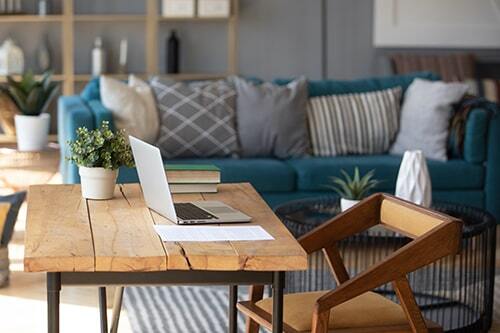New to online therapy? Get ready with these tips!
02-09-2022

Congratulations! You have taken a brave step in admitting that therapy is just the thing you need to add to your self-care routine. Regardless of the amount of time online therapy may save you (no traffic jams, no need to get dressed up, no worrying about making it to your appointment on time), and irrespective of the level of anonymity you may wish to maintain with your therapist, it may still seem pretty overwhelming and nerve racking.
It is normal to feel this way, especially when you do not know what to expect. Here are some tips to help pave the way to a rewarding and fulfilling experience.
Ensure your device is set up and in working order
Test out your connection, camera, and microphone beforehand. If something is not working, take it to your nearest repair store and ensure it will be ready before your appointment.
It might be tempting to use your smartphone for online therapy, but it is not recommended. You may receive calls, messages or alerts during your therapy, and these will interrupt your session. The other reason is that your phone screen is much smaller than a tablet or laptop, and this might make the online therapy experience seem less “real”. A larger screen will enable you to feel more physically present and involved, and provide you with a better experience. With this in mind, your phone could be used as a back-up option in case your main device does not work.
Allow your emotions to rise to the surface
It is absolutely normal to feel anxious before your first session. After all, you will be baring your soul to a complete stranger who will end up knowing everything about you, yet you will know little about them. You will gradually become more comfortable as you go through the process.
Provide yourself with time to adjust
Even though you are not physically travelling to your therapy session, you still need to get there mentally. Allocate time to yourself before the appointment to think about the things you would like to discuss, as well as time afterwards to process the conversation and your emotions.
Make yourself comfortable and relaxed
The more comfortable you are during your session, the more you will be inclined to open up. This will help you to get more out of your time. Surround yourself with objects that calm and soothe you – cushions, soft blankets, scented candles, essential oils, a cup of tea – whatever it may be.
Set your goals and expectations
What do you really want to achieve through these sessions? What expectations do you have of your therapist? It is a good idea to have a personal diary or notebook and pen with you during your therapy sessions to jot down your needs, wants, expectations, emotions you are experiencing, thoughts, and whatever else comes to your mind. This will help you to communicate clearly with your therapist and track your progress.
If you are unsure as to what you expect out of your sessions, then you have a blank canvas. Start off by talking about what is on your mind generally, then zoom in on the details. Your therapist will guide you through it.
Familiarise yourself with the process
Your first appointment is more like an introduction – it is meant for your therapist to get to know you, understand what issues you would like to discuss, and get an overall picture of your situation. You can also ask your therapist questions that cross your mind to help you understand your therapist more. This is the first phase.
The second phase is where the bulk of the work takes place. During this period, you will continue talking with your therapist, implement techniques to raise self-awareness, create a self-care plan, and work towards creating positive changes in your life.
The third phase is termination. This happens when you and your therapist both feel that you are ready to proceed alone and no longer need further sessions.
See therapy as your judgement-free zone
Your therapist is there to help you, not judge you. Do not work yourself up wondering what your therapist will think of you if you reveal all that is troubling you. Therapists are professionals who are there to listen, offer guidance and support, and help you view your situation from a different perspective. What is more, you will not be socialising with your therapist, nor is it likely that you will have friends in common, so make the most of this space as your own safe space, free of judgement.
If you find it difficult to do that, be open about your concerns – tell your therapist that you are feeling anxious about being judged. Your therapist will then have the opportunity to reassure you that there is no judgement, just help.
Give yourself time to open up
There is no need to overwhelm yourself and dive right in to discussing your inner-most thoughts and feelings with your therapist. Take things at your own pace – the more comfortable you feel with your therapist, the more you will want to open up willingly. Remember, trust is earned, not given, and your therapist must earn your trust. If you are not ready to discuss a particular topic, simply mention that to your therapist, and move on to the next.
Start your online therapy journey
Remember, therapy is a journey, not a destination. We have a number of qualified psychologists who can arm you with the tools needed to deal with challenging situations. Select the therapist that is right for you.
Start now
If you enjoyed this article, you might also be interested in How to use areeka web for your online therapy and How to choose the right therapist for you.
It is normal to feel this way, especially when you do not know what to expect. Here are some tips to help pave the way to a rewarding and fulfilling experience.
Ensure your device is set up and in working order
Test out your connection, camera, and microphone beforehand. If something is not working, take it to your nearest repair store and ensure it will be ready before your appointment.
It might be tempting to use your smartphone for online therapy, but it is not recommended. You may receive calls, messages or alerts during your therapy, and these will interrupt your session. The other reason is that your phone screen is much smaller than a tablet or laptop, and this might make the online therapy experience seem less “real”. A larger screen will enable you to feel more physically present and involved, and provide you with a better experience. With this in mind, your phone could be used as a back-up option in case your main device does not work.
Allow your emotions to rise to the surface
It is absolutely normal to feel anxious before your first session. After all, you will be baring your soul to a complete stranger who will end up knowing everything about you, yet you will know little about them. You will gradually become more comfortable as you go through the process.
Provide yourself with time to adjust
Even though you are not physically travelling to your therapy session, you still need to get there mentally. Allocate time to yourself before the appointment to think about the things you would like to discuss, as well as time afterwards to process the conversation and your emotions.
Make yourself comfortable and relaxed
The more comfortable you are during your session, the more you will be inclined to open up. This will help you to get more out of your time. Surround yourself with objects that calm and soothe you – cushions, soft blankets, scented candles, essential oils, a cup of tea – whatever it may be.
Set your goals and expectations
What do you really want to achieve through these sessions? What expectations do you have of your therapist? It is a good idea to have a personal diary or notebook and pen with you during your therapy sessions to jot down your needs, wants, expectations, emotions you are experiencing, thoughts, and whatever else comes to your mind. This will help you to communicate clearly with your therapist and track your progress.
If you are unsure as to what you expect out of your sessions, then you have a blank canvas. Start off by talking about what is on your mind generally, then zoom in on the details. Your therapist will guide you through it.
Familiarise yourself with the process
Your first appointment is more like an introduction – it is meant for your therapist to get to know you, understand what issues you would like to discuss, and get an overall picture of your situation. You can also ask your therapist questions that cross your mind to help you understand your therapist more. This is the first phase.
The second phase is where the bulk of the work takes place. During this period, you will continue talking with your therapist, implement techniques to raise self-awareness, create a self-care plan, and work towards creating positive changes in your life.
The third phase is termination. This happens when you and your therapist both feel that you are ready to proceed alone and no longer need further sessions.
See therapy as your judgement-free zone
Your therapist is there to help you, not judge you. Do not work yourself up wondering what your therapist will think of you if you reveal all that is troubling you. Therapists are professionals who are there to listen, offer guidance and support, and help you view your situation from a different perspective. What is more, you will not be socialising with your therapist, nor is it likely that you will have friends in common, so make the most of this space as your own safe space, free of judgement.
If you find it difficult to do that, be open about your concerns – tell your therapist that you are feeling anxious about being judged. Your therapist will then have the opportunity to reassure you that there is no judgement, just help.
Give yourself time to open up
There is no need to overwhelm yourself and dive right in to discussing your inner-most thoughts and feelings with your therapist. Take things at your own pace – the more comfortable you feel with your therapist, the more you will want to open up willingly. Remember, trust is earned, not given, and your therapist must earn your trust. If you are not ready to discuss a particular topic, simply mention that to your therapist, and move on to the next.
Start your online therapy journey
Remember, therapy is a journey, not a destination. We have a number of qualified psychologists who can arm you with the tools needed to deal with challenging situations. Select the therapist that is right for you.
Start now
If you enjoyed this article, you might also be interested in How to use areeka web for your online therapy and How to choose the right therapist for you.





